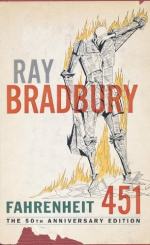|
This section contains 1,708 words (approx. 6 pages at 300 words per page) |

|
SOURCE: "Utopian and Anti-Utopian Logic: H. G. Wells and His Successors," in Science Fiction Studies, Vol. 9, No. 2, July 1982, pp. 122-46.
In the following excerpt, Huntington considers the dystopianutopian structure of Fahrenheit 451 and comments on the paradoxical symbolism of the book as both cultural and technological achievement.
Montag, the protagonist of [Fahrenheit 451], like Graham [of H. G. Wells's When the Sleeper Wakes], D-503 [of Yevgeny Zamyatin's We], and Winston Smith [of George Orwell's 1984], is a man coming toconsciousness and attempting the overthrow or reformation of the closed, totalitarian, futuristic world he valued at the start. As in the other novels we have looked at, here too a woman is the inspiration for the change of mind. As in the other works, the act of seeing beyond the present is at least in part an act of recovery of a lost tradition: Graham is a revolutionary because he retains 19th-century...
|
This section contains 1,708 words (approx. 6 pages at 300 words per page) |

|


